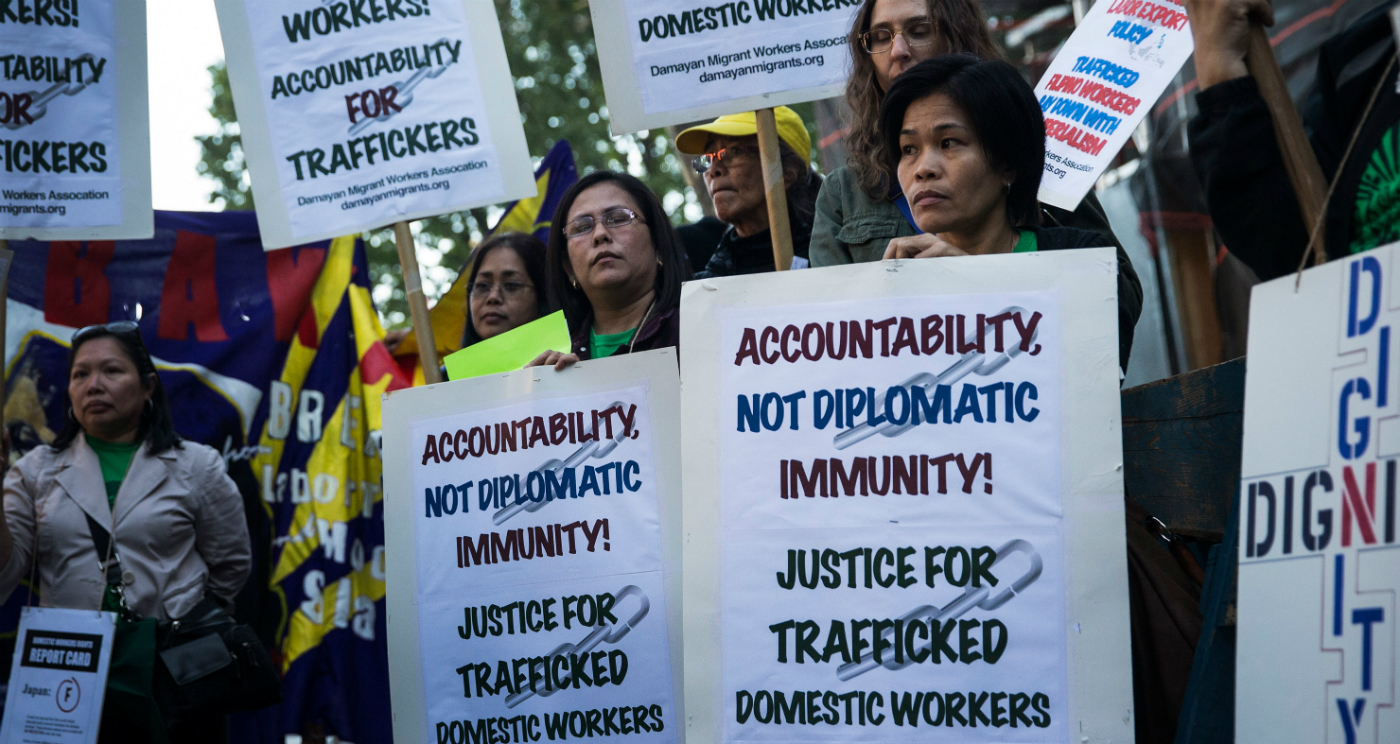Davos 2018: how big a problem is modern-day slavery?
Estimated 13,000 victims in the UK alone

A free daily email with the biggest news stories of the day – and the best features from TheWeek.com
You are now subscribed
Your newsletter sign-up was successful
Thirteen people have been arrested in Birmingham on suspicion of slavery, a global problem that has drawn the attention of world leaders in Davos this week.
Prime Minister Theresa May has called slavery “the great human rights issue of our time” and has pledged to help eradicate the “barbaric evil” of human trafficking. However, a highly critical report by the Commons Work and Pensions Committee last year said there was an “inexcusable” lack of support for the estimated 10,000 to 13,000 slaves in the UK.
More than 40 million people across the globe are living as modern slaves, according to figures compile by the United Nation’s International Labour Organisation and the Walk Free Foundation, a human rights group.
The Week
Escape your echo chamber. Get the facts behind the news, plus analysis from multiple perspectives.

Sign up for The Week's Free Newsletters
From our morning news briefing to a weekly Good News Newsletter, get the best of The Week delivered directly to your inbox.
From our morning news briefing to a weekly Good News Newsletter, get the best of The Week delivered directly to your inbox.
“The more that we look for modern slavery, the more we find evidence of the widespread abuse of the vulnerable,” Will Kerr, of the UK National Crime Agency, said last year.
“We know that once they have been formally identified as victims of slavery, most victims are not given a secure immigration status or right to remain, and so find themselves almost instantly destitute and without anywhere to live,” adds Kate Roberts, from the Human Trafficking Foundation.
The Guardian revealed last weekend that at least seven police forces in England have not charged anyone under modern slavery legislation introduced more than two years ago. Meanwhile, the number of cases of slavery being reported in the UK has more than doubled.
The issue of how to tackle slavery was on the agenda at this week’s World Economic Forum in Davos, Switzerland. The Global Fund to End Modern Slavery, a US-based partnership that unites governments, businesses and charities, “hopes to replicate the success of a similar initiative that boosted financing to tackle Aids, malaria and tuberculosis”, says Reuters.
A free daily email with the biggest news stories of the day – and the best features from TheWeek.com
Gary Haugen, CEO of the International Justice Mission, told the forum that “there are more people in slavery today than were extracted from Africa over 400 years of the transatlantic slave trade”.
The fund to end slavery “is seeking $250m (£176m) from the US, $500m (£352m) from other nations, and $750m (£528m) in private funding, to coordinate global anti-slavery efforts, Reuters reports.
-
 6 exquisite homes with vast acreage
6 exquisite homes with vast acreageFeature Featuring an off-the-grid contemporary home in New Mexico and lakefront farmhouse in Massachusetts
-
 Film reviews: ‘Wuthering Heights,’ ‘Good Luck, Have Fun, Don’t Die,’ and ‘Sirat’
Film reviews: ‘Wuthering Heights,’ ‘Good Luck, Have Fun, Don’t Die,’ and ‘Sirat’Feature An inconvenient love torments a would-be couple, a gonzo time traveler seeks to save humanity from AI, and a father’s desperate search goes deeply sideways
-
 Political cartoons for February 16
Political cartoons for February 16Cartoons Monday’s political cartoons include President's Day, a valentine from the Epstein files, and more
-
 Epstein files topple law CEO, roil UK government
Epstein files topple law CEO, roil UK governmentSpeed Read Peter Mandelson, Britain’s former ambassador to the US, is caught up in the scandal
-
 Iran and US prepare to meet after skirmishes
Iran and US prepare to meet after skirmishesSpeed Read The incident comes amid heightened tensions in the Middle East
-
 Israel retrieves final hostage’s body from Gaza
Israel retrieves final hostage’s body from GazaSpeed Read The 24-year-old police officer was killed during the initial Hamas attack
-
 China’s Xi targets top general in growing purge
China’s Xi targets top general in growing purgeSpeed Read Zhang Youxia is being investigated over ‘grave violations’ of the law
-
 Panama and Canada are negotiating over a crucial copper mine
Panama and Canada are negotiating over a crucial copper mineIn the Spotlight Panama is set to make a final decision on the mine this summer
-
 Why Greenland’s natural resources are nearly impossible to mine
Why Greenland’s natural resources are nearly impossible to mineThe Explainer The country’s natural landscape makes the task extremely difficult
-
 Iran cuts internet as protests escalate
Iran cuts internet as protests escalateSpeed Reada Government buildings across the country have been set on fire
-
 US nabs ‘shadow’ tanker claimed by Russia
US nabs ‘shadow’ tanker claimed by RussiaSpeed Read The ship was one of two vessels seized by the US military